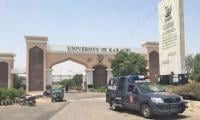KARACHI: Remittances from Pakistanis working abroad rose to $5.94 billion in the first two months of the current fiscal year, compared with $4.12 billion in the same period last year, a 44 per cent increase, the central bank’s data showed on Monday.
The country’s remittances for August increased by 40 per cent, reaching $2.94 billion. However, these inflows dropped by 2.0 per cent compared with the previous month. In July, Pakistani expatriates sent home $2.99 billion.
Analysts attribute the increase in remittances to the narrowing of the spread between interbank and open market rates, as well as the crackdown on hawala and hundi. This trend has also been aided by the greater number of Pakistanis leaving the country. Head of research at Ismail Iqbal Securities Saad Hanif said that while a number of factors could account for the increase in remittances, an increase in Pakistani expatriates, particularly in GCC nations, has contributed to this growth. “Any policy changes in Pakistan to incentivize sending money through formal banking channels may have also contributed to the increase,” Hanif said.
“Whether this marks a new normal depends on the persistence of these factors. If global conditions stay favourable and Pakistan continues to attract remittances through formal means, these elevated levels may stabilize,” he added. “However, global economic shifts or labour market changes could still affect these inflows.”
Last month, the Economic Coordination Committee of the Cabinet approved revisions to two remittances incentive schemes, including the incentive scheme for exchange companies. These incentives are expected to motivate banks and exchange firms to increase remittances from Pakistanis working abroad, thus boosting the country’s foreign exchange reserves. The rising trajectory of remittances signals positive prospects for the economy and supports currency stabilisation. The increased remittance inflows, combined with a significant drop in global oil prices, are likely to benefit the country's external current account. As Pakistan is a net oil importer, fluctuations in oil prices significantly impact its trade balance and inflation.
“The current account is likely to be positive this month, considering the trade numbers published by the Pakistan Bureau of Statistics (PBS) and accounting for interest and dividend payments,” said Awais Ashraf, director research at AKD Securities Limited.
The increase in remittances occurred as the government is looking into different ways to fill the external financing gap, which is essential in securing the final approval for a $7 billion loan from the IMF. The rollovers present a significant challenge for the government. Alongside ongoing negotiations with bilateral partners, the government is actively seeking commercial loans from international banks and investors. SBP data shows that remittances from Saudi Arabia, Pakistan’s largest source of these funds, increased by 51 percent to $1.473 billion in July-August FY25. Moreover, remittances from Pakistani workers in the United Arab Emirates reached $1.15 billion in July-August FY25, marking a significant 84 per cent surge, compared with last year.
Remittances from the UK to Pakistan totalled $918 million, reflecting a 44 per cent increase from a year earlier. The Pakistani diaspora in the US also sent home $622 million in the two months of this fiscal year, representing a 23 per cent rise from a year ago.
Chief Minister Murad Ali Shah is seen visiting a stall after inaugurating the Sindh Livestock Expo 2025 on January 17,...
High Commissioner of Rwanda Harerimana Fatou. — APP/FileKARACHI: High Commissioner of Rwanda Harerimana Fatou has...
People buying jewellery at a jewellery shop. — AFP/FileKARACHI: Gold prices decreased by Rs200 per tola on Saturday...
Visitors visiting a place in Japan. — AFP/FileTOKYO: After travelling to Tokyo for meetings, Yoshiki Kojima’s IT...
People shop at a market in Karachi. — AFP/FileLAHORE: Pakistan’s current economic crisis is multifaceted, driven...
Britain’s Prime Minister Keir Starmer waits for the arrival of France’s President Emmanuel Macron at the Chequers,...







